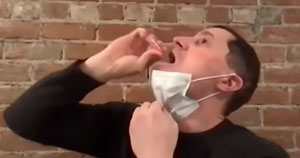U Arizona: Students Must Test for COVID or Lose WiFi Access
- By Dian Schaffhauser
- 12/10/20
The University of Arizona has announced that starting in the spring it will require weekly testing for COVID-19 among students living in dorms or attending in-person classes. If they refuse or forget, they'll lose access to the campus WiFi network. The announcement came during a weekly virtual briefing done by President Robert Robbins. Even students who live off campus but expect to visit the university to access services such as the library or student recreation center will also be expected to have taken a diagnostic test in the previous week, Robbins said.
The institution said it would also start offering a new type of coronavirus test along with the traditional nasal swab antigen and PCR testing.
"Using WiFi access for compliance provides an effective way to focus enforcement," Robbins noted. "Network access is generally necessary to participate in the activities that bring students to campus, such as taking classes, while those students who are not subject to testing requirements because they are not on campus will not be affected by this measure."
Robbins said the hope is that the school will begin its spring semester on Jan. 13 in stage two of its re-entry plan. That allows for classes of 50 students or fewer to meet in person. That plan could change, however, based on local public health metrics.
The university had been operating in stage two before Thanksgiving. But after that break, courses were shifted to remote instruction for the rest of the semester, to discourage students from traveling back to campus. Dec. 9 was the last day of fall classes.
Robbins said that a "testing blitz" will begin on Jan. 6 and run through Jan. 12, to coincide with move-in for dorm residents. Students who test positive will be moved into "isolation" dorm rooms.
The new "swish-gargle" PCR test involves swishing and gargling 5 milliliters of saline solution three times, then spitting into a tube with a funnel top. The results will be available, in most cases, on the same day. The test was developed by lab and medical staff with the British Columbia Provincial Lab Medicine Services, the BC Public Health Laboratory and BC Children's Hospital, which were seeking a way to make COVID-19 testing easier for children and their parents and caregivers.

University of Arizona virology expert Michael Worobey demonstrates a new "swish and gargle" COVID-19 test the campus hopes to put in place during the spring.
According to university virology expert Michael Worobey, initial results from testing on campus have been "encouraging." Worobey heads up the Department of Ecology & Evolutionary Biology and is a member of the university's BIO5 Institute, which has been testing the efficacy of the new test. He said the test is not only more comfortable than the "deep-in-the-nose" or nasopharyngeal swab, but also appears to be more effective, by detecting virus "out of about 30 to 35 percent more people than when you test with the nasopharyngeal swab."
Another advantage, he noted, was that the swish-gargle tests can be self-administered, thereby reducing the risk of exposure for healthcare workers, who must conduct the nasal swab tests.
The university said it expects to have the capacity to conduct 3,000 swish-gargle tests a day.
About the Author
Dian Schaffhauser is a former senior contributing editor for 1105 Media's education publications THE Journal, Campus Technology and Spaces4Learning.